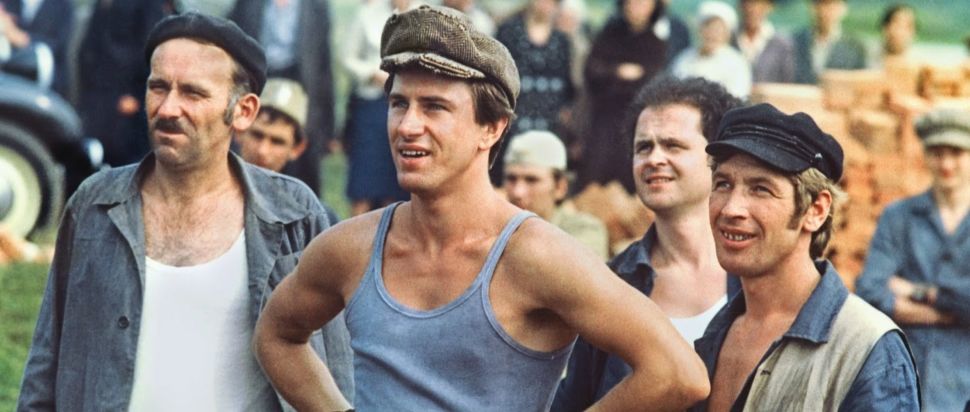Ten Films to Watch this International Workers Day
Workers of the world, unite! And also watch these films from all over the world exploring workers' rights and the power of unionisation
It may only be 46 seconds long but Louis Lumière’s 1895 short Workers Leaving the Factory, often referred to as the first ever motion picture, casts a long shadow. In the more than 125 years since it was made, the subject of labour has been a frequent and fertile ground for filmmakers around the world, exploring its physical, philosophical and political dimensions in various modes and styles. Lighter treatments, like the satirical farce of the Dolly Parton-starring 9 to 5 (1980), exist alongside neorealist dramas about striking miners, such as Salt of the Earth (1954), which was penned, produced, and directed by members of the Hollywood blacklist. Further along that scale are documentaries like the Berwick St Collective’s collaborative and self-reflexive Nightcleaners (1975) and artist-filmmaker Kevin Jerome Everson’s formally rigorous treatment of a dry cleaning production line in Quality Control (2011). In celebration of International Workers' Day, we pick ten films worth keeping an eye out for that engage with unionisation, strike action and the radicalisation of the working class.
Strike (1925)
Sergei Eisenstein’s first feature-length film tells the story of a strike by factory workers at the turn of the century. Intended to convey the process of class struggle to the audience, Eisenstein himself described the work as “bristly and pugnacious”. It's best known for an astonishing montage sequence that cross-cuts suppressed workers with slaughtered cattle. Available on YouTube
The Garment Jungle (1957)
Film Noir might not be a genre you expect to see on an IWD list, but this peek at the seedy underbelly of the garment industry was described by Robert Aldrich, one of its directors, as the "first pro-labour picture." A simmering portrayal of union-bashing and mafia strong-arming, it features an excellent, snarling turn from Lee J. Cobb. Available as part of the Columbia Noir #1 boxset from Indicator
The Land (1969)
An epic drama from Youssef Chahine about corruption and villainy at the expense of honest, hard-working farmers. Set in Egypt in the 1930s, it takes as its premise the halving of water rations which will spell disaster for local villagers. The antagonists are veritably moustache-twirling, but The Land is a complex portrait of self-determination. Available on Netflix
Harlan County, USA (1976)
Documentaries about industrial action hardly come more gruelling and electrifying than Barbara Kopple's exceptional Oscar-winner. It follows the unfurling of a dangerous conflict involving a beleaguered workforce and a mining company in the Appalachian Mountains, combining archival context with visceral first-hand footage of the picket line and clashes between strikers and the violent opposition they faced. Available from Criterion
Man of Marble (1977)
Considered by some to have had a direct impact on Poland’s political progression, Andrzej Wajda’s Man of Marble is an epic tale of a socialist icon who was – in reality – ground down by the system. It was banned quickly after its initial release but was ultimately seen widely. Wajda went on to make a sequel in 1981, Man of Iron, about the Gdańsk Shipyard protests and the rise of the Solidarity Movement. Available from Second Run
Man Marked for Death, 20 Years Later (1984)
Eduardo Coutinho’s first attempt to make Man Marked for Death in 1964, as a docufiction about the murder of a peasant leader, was ended by Brazil’s military coup of that year. Two decades later, he repurposed the surviving footage into a more expansive documentary reflecting on the events of the past and the lingering, sometimes tragic, costs of resistance. Available from Mawu Films
Sweet Sugar Rage (1985)
This mid-length documentary explores the processes of the Sistren Theatre Collective in combating the exploitation of female labourers in the sugar cane fields of Jamaica. Blending talking-head accounts of the conditions with theatre workshops run by Sistren, the film centres on dialogue and dramatic restaging as a way of conceptualising how they might affect change.
La Commune (Paris, 1871) (2000)
A black and white docudrama about the Paris Commune in 1871, this is an extraordinary and ambitious project by Peter Watkins. Reconstructing the spirit of 120 years prior in an abandoned Paris warehouse, Watkins injects an anachronistic video news crew to capture the drama as it unfolds. It’s a febrile and invigorating provocation that is not easily forgotten.
Machines (2016)
French philosopher Michel Foucault believed that people are cogs in the mechanics of power and Rahul Jain’s documentary expresses that cinematically through an experiential portrait of an Indian textile factory. Dotted throughout are interviews with workers and bosses discussing exploitation and union-breaking that allow complexities and contradictions to come to the fore in a thought-provoking way. Available from Dogwoof
Solidarity (2019)
Lucy Parker’s Solidarity seeks to expose the blacklisting of construction workers in the 90s as part of a mysterious anti-union effort that provided firms with tip-offs about 'trouble-making' employees. The film includes interviews, footage from activist meetings, archival materials, and the discussions of a group of student lawyers who are investigating the case. A worthy, relevant rallying call. Available on Vimeo
